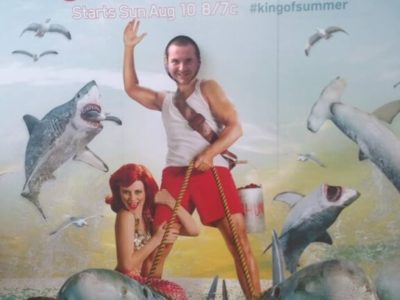Warning: if you want to intern for Discovery Channel, do not choose Shark Week as your favorite show. If you do, consider yourself cut. Syracuse University student Owen Gotimer interned at Discovery this summer and quickly discovered that his knowledge of Moonshiners proved he was a true fan of the channel—or he at least did his research. As a research and development intern, Gotimer unearthed the weirdest stories to pitch for a new show. By the end of the summer his idea was chosen. Gotimer shares how to beat out 15,000 other applicants and get the internship opportunity of a lifetime.
Why do you think Discovery Channel liked your resume?
I've worked for the same sports blog for six years now. I started as an unpaid student journalist in high school, became an unpaid student intern, became a paid student intern, and became the editor of the college sports section. We started with 50,000 page views per year, now we are getting over 5 million. I think that companies like seeing that you can stick with something. In terms of the layout, my resume is all black and my name is in orange so it stands out.
What was it like being interviewed by Discovery Channel?
A lot of broadcast companies are going to this Skype-type interview. It's not in front of another person, which is a little weird but basically it records you answering questions, so half the screen will be a video monitor of your own face and the other half is a question. Every 30 seconds a question will pop up, they'll give you time to read it and practice what you're going to say for 30 seconds, and then you have two minutes to answer the question in its entirety. NBC, ABC, Discovery Channel are all doing that because a lot of different hiring managers might be looking at the video.
How did you approach your interview?
Going in there with confidence is definitely impressive. I made sure to relate a lot of the questions back to my experiences in the past because that can show my personality in that way.
How did you prepare…did you rehearse with your mom?
I sat down with my friend and had her read off a series of questions that I thought would be asked. I've applied for other jobs where I knew that people have worked there before and I called them and said, “What kind of questions did they ask you?” Going into the interview and knowing what they're going to ask helps a whole lot.
What lessons helped you succeed at Discovery Channel?
Having a drive for your work, having some sort of passion for it really helps. I started watching all of their programs before just so I could have familiarity with them. Going in there with this passion, it allowed me to provide better work for them because I was interested in it. I'm also very on top of everything— I don't procrastinate— so if I have something due in three weeks it'll be done tomorrow.
What are some of the frustrations in applying for internships?
After you send in that application, you sit around, not knowing, not having answers. I applied to the ESPN internship in February and didn't hear back from them until mid-April and I had already accepted the internship at Discovery.
How should other students approach the application process?
It's important to not limit yourself. I went in applying for my first internships looking at one or two companies but last spring I applied to 19 internships and I got offered one. So you have to make sure you're not limiting yourself whether it'd be number of internships, companies you want to work for, the field you want to work in, and location.
What connections did you make at Discovery Channel?
The networking is incredible. The first day at Discovery, I went out for lunch with the vice president of programming, and she said, "What do you want to do with your life?" At that point I said I wanted to work for ESPN and she said her best friend works at Around the Horn.
What was the greatest lesson you learned?
Making sure you take every opportunity you have. A lot of interns were set on getting their work done and that was their job for the day. I took every opportunity I had, meaning if a producer said, "Owen, we're having a production meeting, do you want to come?" I'd say yes right away. I jumped onto everything because not only is it going to help me network but it helps people remember who you are and you might learn something in one of those meetings.
What was the biggest reward?
I went into Discovery Channel with this idea of this company that is grandiose, that everyone knows about, that this is something I want to do with my future. This is kind of sadistic but I got there, and three weeks in I realized this is not what I want to do with my future. For me, sitting at an office from nine to five, five days a week, for my entire life is not something that I want to do. It helped me put into perspective what I really want out of my life. If it's not something you want to do, waking up every day to do it is not going to be fun.
Photo courtesy: Owen Gotimer, Photo Credit: Connor Barrett



















